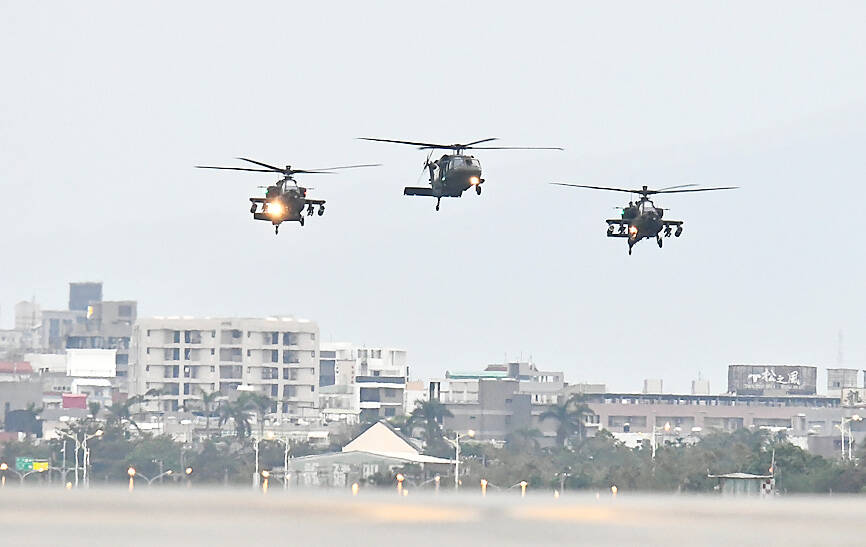The army is seeking to purchase an additional 30 Sikorsky UH-60 Armed Black Hawk helicopters, as well as looking into upgrading its fleet of UH-60M Black Hawks with Hellfire missiles, rockets and autocannons, a source with knowledge of the matter said yesterday on condition of anonymity.
The army has a surplus of AGM-114 Hellfire missiles, but lacks sufficient platforms outside the Boeing AH-64 Apache, the Bell AH-1 Cobra and the Bell OH-58 Kiowa, the source said.
Despite their superior numbers within the army, the UH-60 does not possess the racks and system to attach and fire missiles, the source said.

Photo: Yu Tai-lang, Taipei Times
The nation fields 58 Black Hawks, of which 30 were assigned to the army, 14 to the air force and 14 to the Ministry of the Interior’s National Air Service Corps, the source said.
Taiwan purchased 60 helicopters from the US, but two have crashed, with one of the incidents in 2020 resulting in the death of eight people, including Taiwan’s then-chief of the general staff General Shen Yi-ming (沈一鳴), the nation’s most senior military official ever killed in such an incident.
The army received UH-60Ms, which can deploy two machine guns, while the National Air Service Corps’ craft were outfitted with infrared scanning equipment before delivery.
The military is looking into ways that would allow the army to deploy sufficient helicopters in the event of losses in a conflict, the source said.
The military expressed interest in acquiring the Armed Black Hawk version after Lockheed Martin’s Sikorsky, the manufacturer, in September last year released footage of live-fire exercises in Arizona conducted by the variant.
The video showed a pilot with an ANVIS/HUD-24 helmet-mounted display and tracker system, with the helicopter carrying an electro-optical infrared sensor on the nose, M134 7.62mm mini-guns at each cabin door, a pair of GAU-19 .50 Gatling guns, a 70mm Hydra rocket pod and a rack of AGM-114 Hellfire missiles.

INVESTIGATION: The case is the latest instance of a DPP figure being implicated in an espionage network accused of allegedly leaking information to Chinese intelligence Democratic Progressive Party (DPP) member Ho Jen-chieh (何仁傑) was detained and held incommunicado yesterday on suspicion of spying for China during his tenure as assistant to then-minister of foreign affairs Joseph Wu (吳釗燮). The Taipei District Prosecutors’ Office said Ho was implicated during its investigation into alleged spying activities by former Presidential Office consultant Wu Shang-yu (吳尚雨). Prosecutors said there is reason to believe Ho breached the National Security Act (國家安全法) by leaking classified Ministry of Foreign Affairs information to Chinese intelligence. Following interrogation, prosecutors petitioned the Taipei District Court to detain Ho, citing concerns over potential collusion or tampering of evidence. The

‘FORM OF PROTEST’: The German Institute Taipei said it was ‘shocked’ to see Nazi symbolism used in connection with political aims as it condemned the incident Sung Chien-liang (宋建樑), who led efforts to recall Democratic Progressive Party (DPP) Legislator Lee Kun-cheng (李坤城), was released on bail of NT$80,000 yesterday amid an outcry over a Nazi armband he wore to questioning the night before. Sung arrived at the New Taipei City District Prosecutors’ Office for questioning in a recall petition forgery case on Tuesday night wearing a red armband bearing a swastika, carrying a copy of Adolf Hitler’s Mein Kampf and giving a Nazi salute. Sung left the building at 1:15am without the armband and apparently covering the book with a coat. This is a serious international scandal and Chinese

Seventy percent of middle and elementary schools now conduct English classes entirely in English, the Ministry of Education said, as it encourages schools nationwide to adopt this practice Minister of Education (MOE) Cheng Ying-yao (鄭英耀) is scheduled to present a report on the government’s bilingual education policy to the Legislative Yuan’s Education and Culture Committee today. The report would outline strategies aimed at expanding access to education, reducing regional disparities and improving talent cultivation. Implementation of bilingual education policies has varied across local governments, occasionally drawing public criticism. For example, some schools have required teachers of non-English subjects to pass English proficiency

TRADE: The premier pledged safeguards on ‘Made in Taiwan’ labeling, anti-dumping measures and stricter export controls to strengthen its position in trade talks Products labeled “made in Taiwan” must be genuinely made in Taiwan, Premier Cho Jung-tai (卓榮泰) said yesterday, vowing to enforce strict safeguards against “origin laundering” and initiate anti-dumping investigations to prevent China dumping its products in Taiwan. Cho made the remarks in a discussion session with representatives from industries in Kaohsiung. In response to the US government’s recent announcement of “reciprocal” tariffs on its trading partners, President William Lai (賴清德) and Cho last week began a series of consultations with industry leaders nationwide to gather feedback and address concerns. Taiwanese and US officials held a videoconference on Friday evening to discuss the